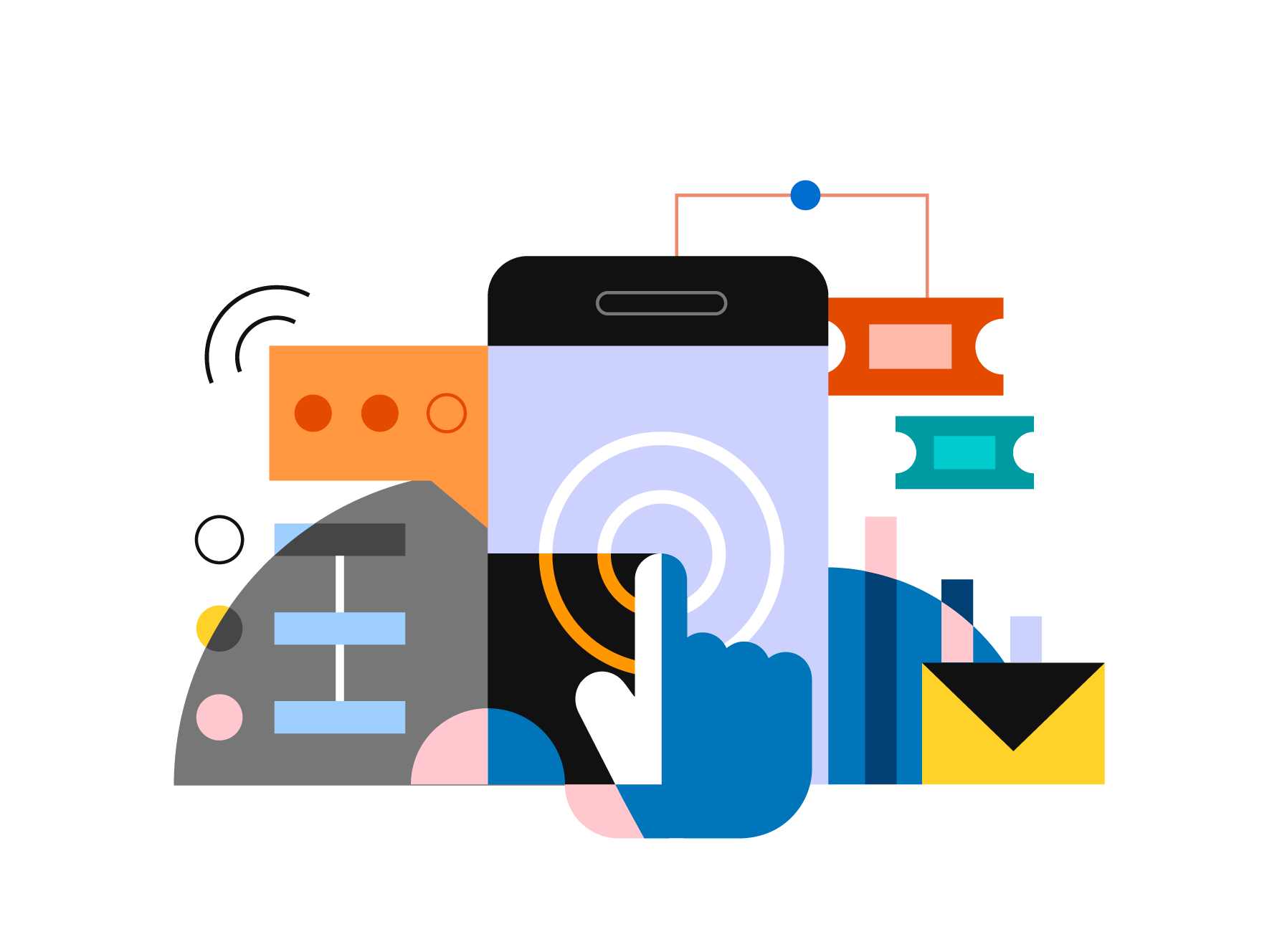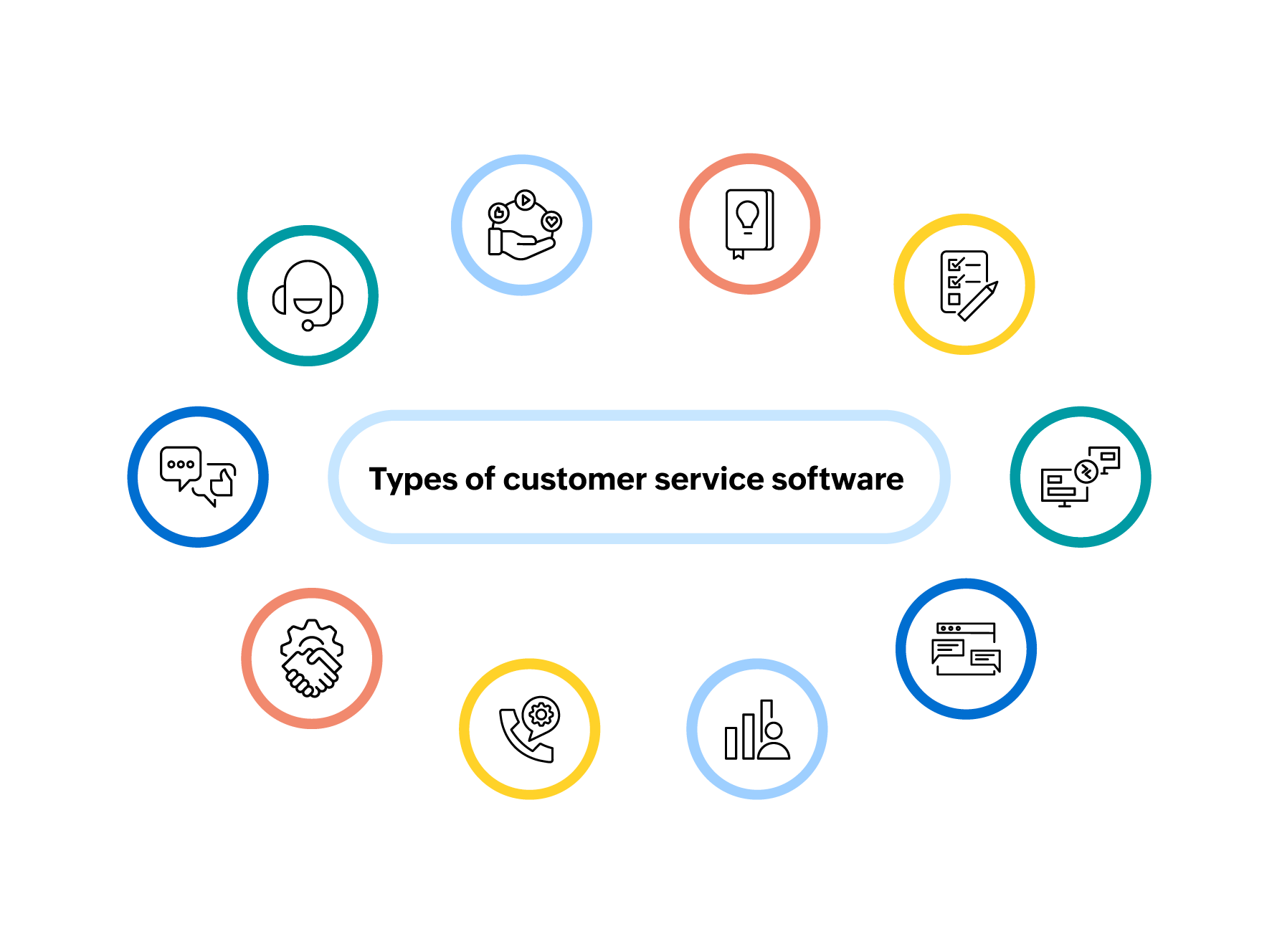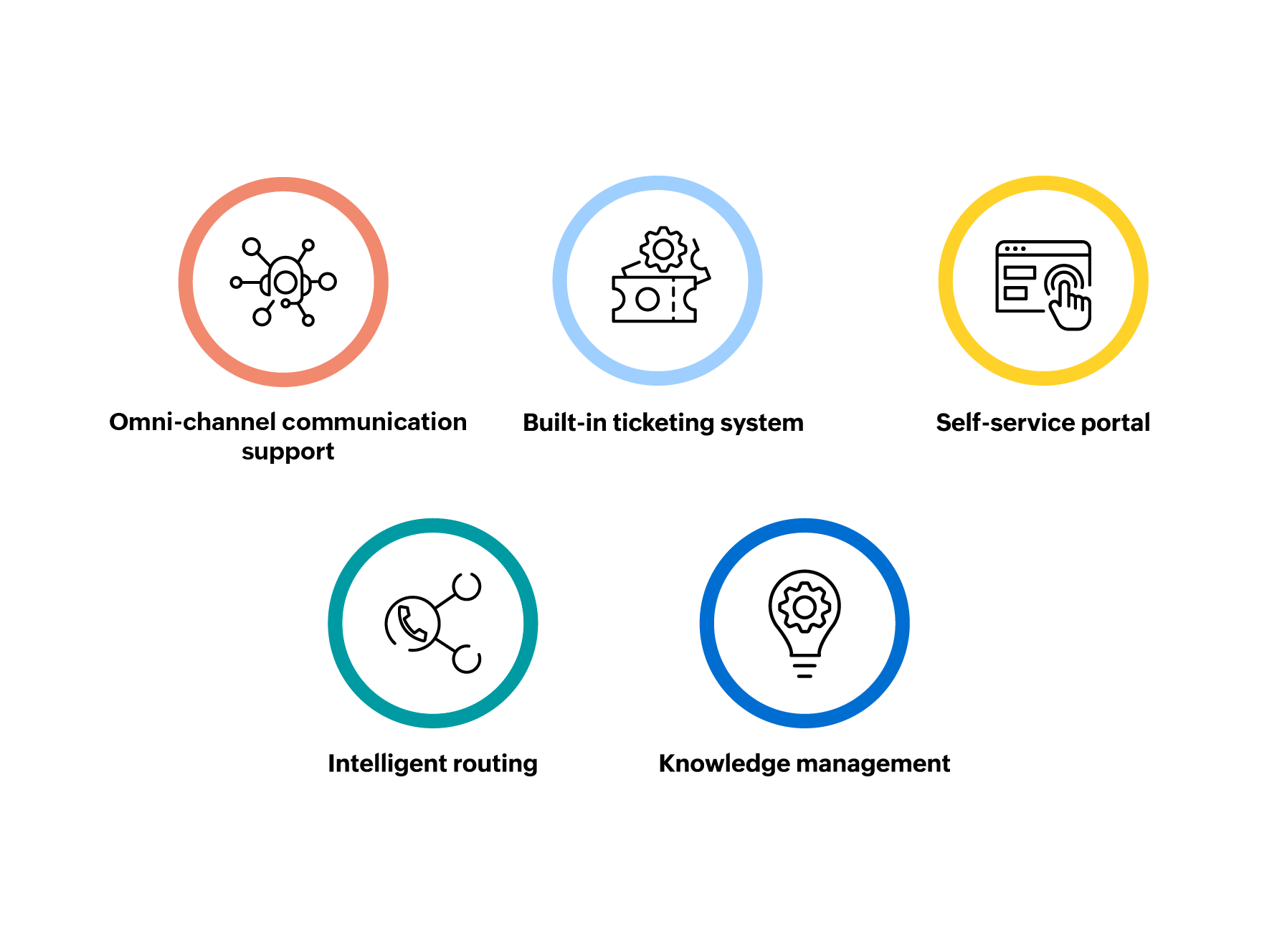What is customer service software?

Customer service software is a tool for collecting, organizing, responding to, and reporting on support requests. It handles various communication channels by combining email, live chat, messaging, and self-service.
By centralizing support through multiple communication channels, it facilitates smoother interactions. It automates and organizes queries, ensuring efficient, prioritized responses. It also consolidates messages from different channels such as phone, email, chat, self-service portal, etc., which helps to decrease the workload of staff, ensuring that no customer issues are missed and allowing for quick resolution.
With robust reporting, customer service software measures and enhances service quality. Insights into response times, common issues, and satisfaction levels empower businesses to fine-tune strategies, improve experiences, and strengthen customer relationships.
Why is customer service software important?
Customer service software allows businesses to automate customer self-service procedures and provide additional support to frontline employees as they assist customers. In a world that is becoming increasingly focused on commercialization, customer service plays a crucial role and serves as a significant distinguishing factor for businesses.
According to Forrester, investing in a customer-first operation can yield at least a 700% ROI over 12 years. Customer support software guarantees that the service is timely, precise, uniform, and in accordance with regulations. This results in exceptional experiences for customers and frontline staff. This ultimately contributes to increased revenue and decreased costs.
Types of customer service software

Customer service can be categorized into two types: internal and external. Internal customer service involves assisting employees within a company, and external customer service involves supporting customers who purchase or use its products or services. Each customer service channel is typically regarded as a distinct form of customer service.
The following are the primary types of customer service that companies should be aware of:
- Help desk software: Manages and resolves customer queries and issues efficiently by organizing tickets and automating responses.
- Live chat support: Enables real-time communication between customers and support agents for immediate assistance.
- CRM software: Tracks customer interactions, purchases, and preferences to enhance personalized service.
- Call center software: Facilitates managing and monitoring phone-based customer support interactions.
- Social media management tools: Helps in monitoring and responding to customer inquiries and feedback on social platforms.
- Knowledge base software: Provides a centralized platform for self-service where customers can find answers to their queries.
- Feedback and survey tools: Collect customer feedback and conduct surveys to understand their satisfaction levels and gather insights for improvement.
- Remote desktop support: Allows support agents to remotely access and troubleshoot customer devices or systems to provide hands-on assistance.
- Customer analytics tools: Analyze customer data and behavior to identify patterns, trends, and areas for improving service and customer experience.
- Community forums or online communities: Platforms that enable customers to interact with each other, share experiences, and find solutions without direct support agent involvement.
These software types cater to different aspects and channels of customer service, aiming to provide efficient, personalized, and timely support to enhance the overall customer experience.
Benefits of customer service software
Delivering excellent customer support is possible without relying on specialized software, and many online businesses initially use a free email account. However, as companies expand, they often encounter limitations and challenges. Employing a dedicated customer support software allows automated responses to common customer queries, quick responses to customer inquiries, and helps resolve issues to create enhanced customer experiences. This leads to improved customer loyalty.
Here are the primary ways in which a specialized tool can facilitate these experiences:
Streamline support
Specialized support software offers a wide range of features, including seamless integration with knowledge bases, pre-saved responses, and advanced AI chatbots, ensuring a reliable channel for customers to connect with your team. Incorporating automated workflows and efficient tagging mechanisms further optimizes operational processes, enabling your team to prioritize and deliver consistent, dependable customer assistance.
Compile consumer feedback
Identify, gather, and categorize all valuable feedback, requests for new features, reports on bugs, and use cases in order to enhance customer satisfaction.
Improve collaboration
Customer service software allows for the reduction of repetitive tasks, the ability to monitor customer inquiries, facilitate collaboration among various teams, and provide current and accurate responses.
Gain insights
Utilize the built-in reporting functions of customer service software to gain insight into changes in support volume, team productivity, customer traits such as their type and size, and various other metrics.
Increase the capacity of your service
Ensure that as your business expands, you can provide excellent service by utilizing tools that can effectively manage numerous teams of agents to cater to a large customer base. These tools should possess organizational capabilities, automated functions, and the ability to integrate with third-party platforms.
Why does automating customer service matter to businesses?
Automating customer service provides numerous advantages for businesses, including:
- Efficiency: Automation streamlines repetitive tasks, like answering FAQs or routing tickets, allowing agents to focus on complex issues and leading to quicker resolutions.
- Rapid response: Automated systems enable immediate responses to customer queries, significantly reducing wait times and ensuring timely interactions, and enhancing overall satisfaction and retention.
- 24/7 availability: Automated systems can handle inquiries and create tickets at any time, ensuring a level of support outside regular business hours.
- Consistency: Automated responses maintain uniformity in information provided, ensuring customers receive the same accurate answers to common queries.
- Cost savings: Reducing manual workload through automation can lower operational costs by requiring fewer human resources for routine tasks.
- Scalability: As businesses grow, automated systems can handle increasing volumes of inquiries without a linear increase in labor costs.
- Data Insights: Automation tools gather and analyze data, providing valuable insights into customer behavior, preferences, and common issues, aiding in strategic decision-making.
Ultimately, automating customer service not only enhances operational efficiency but also contributes to better customer experiences by providing faster, more consistent, and available support.
What are the most common customer service software functions?
The functionalities within customer service software platforms encompass a diverse array, typically categorized into six primary areas of focus.
- Collection: These functionalities facilitate the intake of customer communications into the system, encompassing channels such as support email addresses, contact forms, phone systems, messaging interfaces, and APIs. These tools might have pre-installed interfaces and can also connect with external providers.
- Organization: These features structure incoming communications to enable efficient management by customer service teams. They include tools for manual arrangement, automation, and essential elements like folders, tags, workflows, multiple mailboxes, and custom fields for structured data capture.
- Collaboration: Enabling effective teamwork, collaboration features allow various team members to work seamlessly on incoming support. They encompass team structures, conversation assignment capabilities, internal and private notes for communication between staff members without customer visibility.
- Response: Covering the spectrum of replying to customer queries, response features include text editors for composing replies, social messaging tools for public responses, and knowledge base systems for sharing help documents.
- Integration: Many platforms offer direct integrations and APIs, linking customer service data with other systems like communication tools, CRM software, e-commerce services, social platforms, and internal systems, fostering informed decision-making.
- Analysis and Reporting: These functionalities provide insights into customer demographics, needs, pain points, and operational efficiency. Reporting typically includes metrics such as time to first response, customer satisfaction levels, resolution times, request volumes, and common categories of inquiries.
While some features are ubiquitous across customer support platforms, others vary in prevalence or implementation methods.
Key capabilities of best-in-class customer service software

Some key capabilities of customer service software include:
Omni-channel communication support
An omni-channel communication support is a strategy that involves providing customer support across multiple channels and touchpoints. Regardless of the channel that the customer uses to start a conversation, it allows seamlessly transfers between channels for a more personalized support.
Unified agent desktop
A unified agent desktop (UAD) is an integrated application that brings together all the necessary tools, software, and information for customer service. It is a centralized tool that enables agents to handle various tasks across different communication channels, including phone calls, emails, chats, and general tasks from a single interface.
Built-in ticketing system
Having a built-in ticket system ensures efficient ticket management like prioritizing and categorizing tickets based on their origin, automatic ticket assignment, etc., and ensuring the smooth operation of your business. It also provides you with a centralized dashboard to view all tickets and customer details, which helps you prioritize based on requirements.
Self-service portal
A self-service portal provides customers with information and solutions to their questions using features like AI chatbots, knowledge base articles, and automated task management. Customers can use it to find solutions without an agent’s assistance.
Intelligent routing
Intelligent routing is a system that recognizes the customer and their purpose for reaching out to your company. It then guides the interaction to the most suitable agent for that particular customer, according to predetermined criteria.
Case management
Customer case management is the process of handling customer issues. It includes assigning cases and tickets, routing cases, resolving them, analyzing, and reporting these cases.
Knowledge management
Customer knowledge management is the systematic process companies use to collect, retain, assess, and examine customer information, including buying patterns, demographics, feedback, and previous interactions. This data is compiled into a knowledge base, facilitating its distribution among teams to enhance customer service.
How to choose the right customer service software?
Define your needs
Identify the primary issues that need to be addressed when searching for customer support management software. Also, determine metrics and results that will enhance the customer experience. Consider customer expectations and preferences, and define requirements to narrow down the choices and ensure that the software meets the needs of the organization.
Compare features and benefits
It is essential to create a detailed list of customer service software assessing their advantages and features, and comparing them to each other and to your objectives and expectations. By examining how each solution corresponds with your needs and how it has a upper hand than from all other choices will help you make informed decision.
Check integrations and compatibility
When selecting customer support management software, consider its compatibility and integration with other tools and systems used in your business. This enables streamlined workflows, data sharing, task automation, and improved customer experience. While looking at integrations, also consider the ease of setting these up in your existing environment.
Test operations and performance
Before committing to a customer service software, evaluate its operations and performance. Observe its performance in different scenarios and its handling of errors and issues. Opt for product demos, and use free trials where possible, to evaluate how well the product meets your needs.
Consider scalability and service
It is important to consider scalability & support of customer service software. Assess flexibility and cost-effectiveness, as well as options and limitations for scaling. Evaluate the responsiveness and helpfulness of support team, available resources, and channels for assistance.
Improve customer service experience with ManageEngine’s SupportCenter Plus
The key measure of business success is its level of effectiveness in assisting customers in achieving their objectives. Ensuring effective customer service is one of the key factors for customer retention, thus leading your business to a long term success.
ManageEngine’s SupportCenter Plus provides a wide range of features that make it a valuable solution for customer service platform. Step up your customer support game by effectively managing customer tickets, their account and contact information, service contracts, and in the process, provide a superior customer experience.
SupportCenter Plus offers a consolidated platform to simplify customer support, boost agent efficiency, and enhance customer satisfaction.
Multi-channel support: Tracks customer interactions across various channels
Advanced ticketing system and automation: Improves workflows and response times
Knowledge base: Empowers agents and customers with self-service options
Integration with external apps: Enhances collaboration for efficiency
Are you interested in finding out what features customer support software can offer?